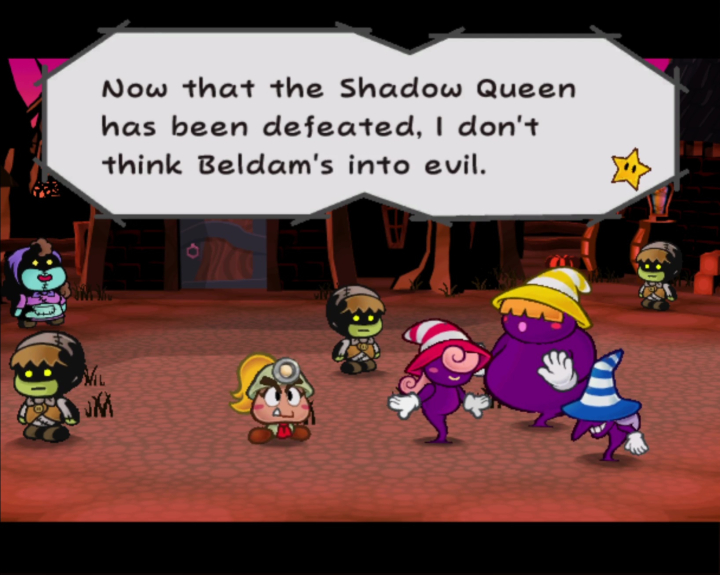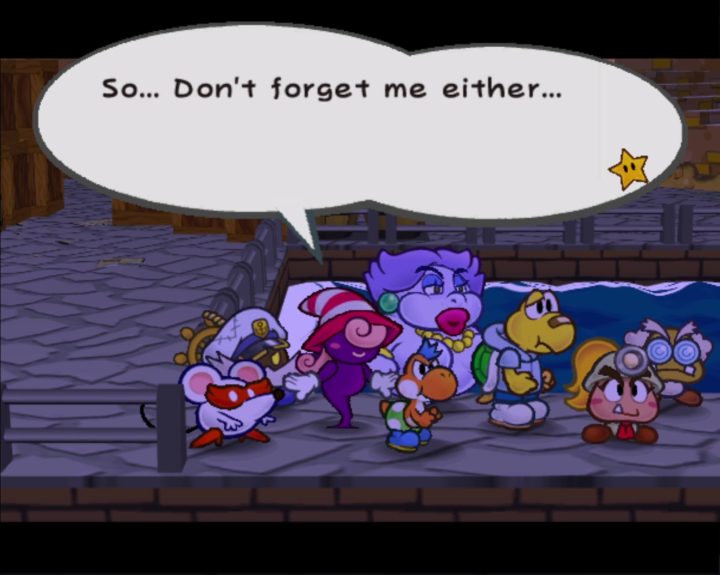
Specific scrutiny of the phrasing used will be as worthwhile as the rest of this analysis (however worthwhile that is). The text is mostly identical between versions. In both the 2004 and 2024 Japanese releases, Goombella writes, 「ビビアンは お姉さんたちの ところに もどりました」“Vivian has gone back to the place her sisters are.” In 2024, the localizers may have realized this is unbelievable because they added an emendation: “Vivian’s gone back to hang out with her sisters. Family is important, after all…” The comment with ellipsis implies Goombella thinks Vivian returning to Beldam and Marilyn is weird. The remake’s English script alters the line yet again: “Vivian’s gone back to hang out with her sisters. She wants to give them another chance.” Where the 2004 English text is slightly condescending, the 2024 line at least attempts a more positive framing, giving Vivian the initiative. However, while a story where Beldam changes and Vivian forgives her is possible, this story is nonetheless not the one presented in The Thousand-Year Door.
Vivian’s reconciliation with her sisters is just one of the over-the-top saccharine endings that defang some of the drama. Whether this is worse writing than retconning, within the same script that established their deaths, that Grodus, Crump, and TEC are inexplicably still alive remains to be seen. The writers might as easily have had Vivian decide to go to school with Goombella or some other less unearned resolution. Ultimately, however, there is only so much Vivian was ever going to be able to do as a one-off character in a Mario game. She could never have much of a relationship with an untalking robot of a player avatar who is also a strictly regulated corporate mascot with an established love interest. Despite how many words I have spilled, let’s not forget that the entire cast are effectively meant to be children’s toys bouncing around a world of dioramas.

Vivian’s last line of dialogue is her asking Mario, really the player, not to forget her: “I’ll never forget my time traveling with you. So… Don’t forget me either…” And the onus was on players. Starting in 2012, Nintendo moved to relegate the narrative-focused half of the Paper Mario franchise of which Vivian is a part to the past, even having the series written out of canon in 2015’s Mario & Luigi: Paper Jam. I hope that the suits at Nintendo green-lighting a remake of The Thousand-Year Door in 2024 signals a return of openness to more complex stories, and characters like Vivian, in future products.
She is certainly better representation than the Mario franchise’s old trans punchline, Birdo, but whether or not Vivian is “good” representation is not ultimately for me, a cisgender man, to decide. I can say, anecdotally, that the handful of trans people I’ve seen online who care about such things love Vivian. And I can also say the willingness to embrace rather than downplay this aspect of the character, much less to include it at all in the 2024 English release, are welcome developments. Vivian’s unique role means many fans of The Thousand-Year Door will indeed not forget her for some time.
This essay is also on Tumblr.